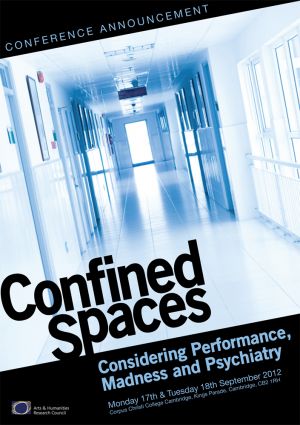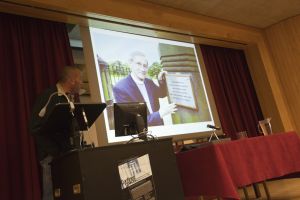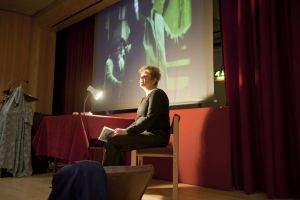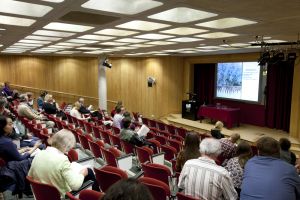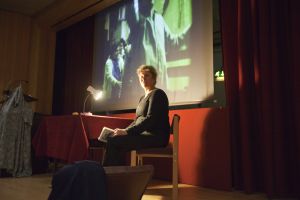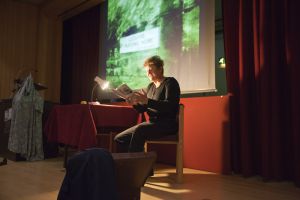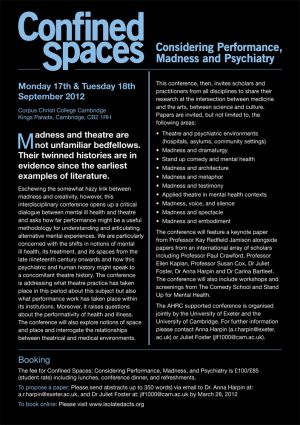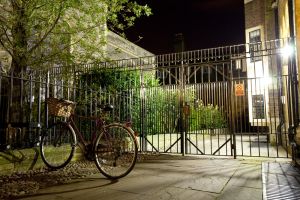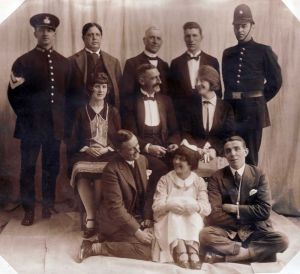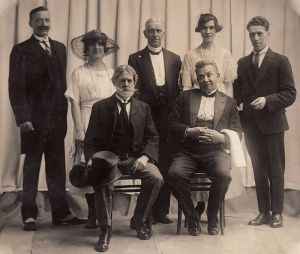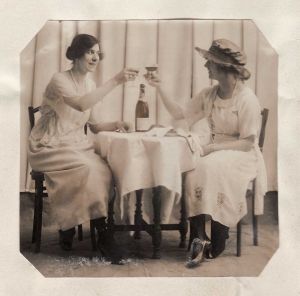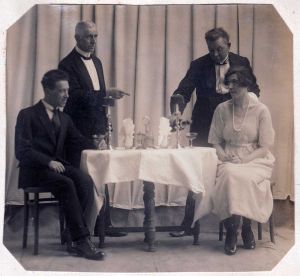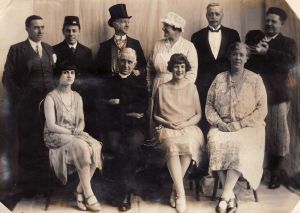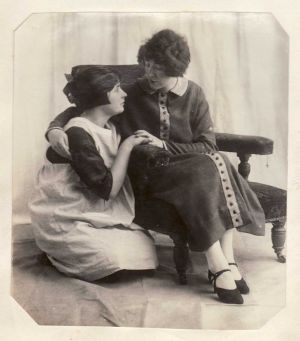Who We Are
Dr Anna Harpin
Anna is a lecturer in contemporary performance at the University of Exeter. She was awarded her PhD from the University of Cambridge in July 2009 and took up the post in Exeter in January 2010. Her PhD was an exploration of British and Irish theatre and performance, medicine, and ethics since 1983. She is particularly concerned with the intersections between philosophy, pathology, politics, and aesthetics. More specifically, Anna is concerned with mental health, psychiatry, ageing, learning impairments, child sexual abuse, torture, trauma, and human rights. Anna is currently writing a monograph on theatre and madness since 1959. Her research in this regard is engaged with poststructuralist philosophers including Foucault, Derrida, and Rancière.
Anna’s recent publications include (2012) ‘The Lives of Our Mad Mothers: Ageing and Performance’ in Women and Performance: A Journal of Feminist Theory, (2011)’Intolerable Acts’ in Performance Research: On Trauma, (2011) ‘Land of Hope and Glory: Jez Butterworth’s Tragic Landscapes’ in Studies in Theatre and Performance, and (2010) ‘Marginal Experiments: Stepping Out Theatre Company and Peter Brook’ in RiDE: The Journal of Applied Theatre. She has also given recent conference papers on subjects including Howard Barker, stand-up comedy, and masculinity.
In addition to her academic research, Anna is also a theatre practitioner. In 2010 Anna co-founded Idiot Child; an exciting new theatre company making playful and peculiar work in the South West. Drawing on autobiography and memory, the company devise bleak, comic tales that emerge from the facts, objects, and oddities of their own lives. The company make work that is concerned with comedy, pain, and theatricality and always place the audience at the heart of their work. Most recently the company performed their new work, You’re not doing it right ,at The Tobacco Factory Theatre, Bristol to sell-out houses and critical success. Their projects in 2010 include Choking Hazard and I could’ve been better both at Bristol Old Vic and Isle of Shame as part of the Eddie King project at the Tobacco Factory. In 2012 Idiot Child have been commissioned to stage I could’ve been better in at Bristol Old Vic.
Anna is the principal investigator on this AHRC-funded project.
Dr Juliet Foster
Dr Juliet Foster is a Fellow and Director of Studies at Corpus Christi College and a Lecturer in Social Psychology in the Division of Social and Developmental Psychology, University of Cambridge. She is particularly interested in social psychological approaches to mental health and mental health problems, focusing especially on the way that different groups within society understand mental health and illness, and the consequences of these understandings. As part of this, she has focused on the ideas and experiences of mental health service users, and published a book on this with Palgrave in 2007 (Journeys Through Mental Illness: clients’ experiences and understandings of mental distress). She has also researched understandings held by the general public, and those found in the media, and, most recently, undertook a study of the representations found in the images and text in advertisements in professional journals for psychiatric and non-psychiatric medication. Central to Juliet’s theoretical approach is a commitment to social constructionism, and in particular to social representations theory: she has published widely on this, and is currently an Associate Editor of Papers on Social Representations.
In addition to her research and teaching, Juliet is also actively involved in various outreach programmes, speaking to schools and teachers, and also on occasions to mental health groups about her own work and about university.
Juliet’s interest in theatre and psychiatric hospitals is centred on the plays and performances that went on in the old hospitals, and the effects that these might have had on patients, staff and the wider community. She is conducting archive research on this, and is also keen to collect any stories or memories that people might have of theatre in the old psychiatric hospitals. A short survey can be found here for anybody who might be interested in contributing http://ppsisfaculty.qualtrics.com/SE/?SID=SV_6G04gi7E0jYzwl6.
Juliet is the co-investigator on this AHRC project.
Professor Paul Crawford
Paul Crawford is Professor of Health Humanities at the School of Nursing, Midwifery and Physiotherapy, University of Nottingham. He is a Fellow of the Royal Society of Arts, Professorial Fellow of the Institute of Mental Health, and holds various international positions. He is Co-Founder of the Health Language Research Group at the University of Nottingham, bringing together academics and clinicians to advance communication research in health care settings. He serves on the editorial boards of Journal of Medical Humanities, Communication & Medicine and Applied Arts in Health and acts as a referee for several prominent publishing houses and major journals. In 2008 he was awarded a Lord Dearing Award for Excellence in Teaching and Learning. He has originated and led interdisciplinary, innovative projects that advance health communication and health humanities research, attracting funding from ESRC, AHRC, The Leverhulme Trust and The British Academy. He led the AHRC Madness and Literature Network (www.madnessandliterature.org), which included convening the first International Health Humanities Conference in 2010. The second International Health Humanities Conferencewill be held at Montclair State University, New Jersey in August 2012. Crawford also convened the Interdisciplinary Conference on Communication, Medicine and Ethics (COMET) in 2011. He leads the AHRC-funded International Health Humanities Network. He has published variously on health communication, literature, narratives and research philosophy, including Communicating Care (1998), Politics and History in William Golding(2003, Evidence Based Research (2003), Storytelling in Therapy (2004); Evidence Based Health Communication (2006), Communication in Clinical Settings (2006) and Madness in Post-1945 British and American Fiction (2010). His acclaimed novel, Nothing Purple, Nothing Black was published in 2002. He is currently co-writing books on mental health (Oxford University Press) and contemporary theory (Routledge).
Mr Mark Davis
Born and bred in Bradford, Mark Davis is committed to delivering the perfect photographic image. A fearless, versatile, and passionate photographer, Mark is equally at home whether at great height or at ground level, and is always seeking to capture and preserve that fleeting moment in time. As a keen social historian focusing on the West Riding Asylum in particular, Mark has photographed Bradford from the core out for several years, recording the ongoing evolution of this great northern city.
Mark has worked for the National Media Museum, ‘Northern Life’ magazine, Ben Bailey Homes, BMW Automobiles, The BBC, Bedlam, The Imperial War Museum, Eddisons (Leeds), and Cedar Court Hotels. His work has also been exhibited in Menston under the banner “Reflecting On High Royds – A Haunting Portrait of the Former Psychiatric Hospital”.He is also closely involved with High Royds Memorial Garden as a campaigner dedicated to giving a voice to those that were sadly without voices in life.
Professor Susan Cox
Susan Cox is an Associate Professor at The W.Maurice Young Centre for Applied Ethics. She specializes in qualitative health research and is currently conducting research on the meaning and experience of being a human subject in health research and on the use of arts-based methods in health research. She is especially interested in the novel ethical challenges arising from the use of arts based-methods in research and knowledge dissemination. Other areas of interest include the social and ethical implications of new reproductive and genetic technologies disability studies, ethical dimensions of interpersonal communication (in clinical and non-clinical contexts), narrative, and the role of social science methodology in ethical analysis. Cox’s recent publications appear in Social Science and Medicine, Academic Ethics, Journal of Empirical Research on Human Research Ethics, Health Law Review and Arts and Health. Cox serves on the Research Ethics Board for Emily Carr University of Art and Design and the Ethics Task Force for the Society for the Arts in Healthcare. When times permits, she writes poetry and is an aspiring pastry chef. http://www.ethics.ubc.ca/index.php?p=personweb7
Professor Carla Yanni
Carla Yanni is Professor of Art History at Rutgers, The State University of New Jersey, USA. Her areas of scholarly interest include architecture, science and medicine from the beginning of the nineteenth century to the present. Now in its third printing, The Architecture of Madness: Insane Asylums in the United States, was published by University of Minnesota Press in spring 2007. In 2000, Johns Hopkins University Press published her first book, Nature’sMuseums: Victorian Science and the Architecture of Display. She is currently writing a book on the architecture of collegiate dormitories and residence halls.
Dr Jehannine Austin
Jehannine Austin is an Assistant Professor in the Departments of Psychiatry and Medical Genetics at the University of British Columbia in Vancouver, Canada and holds the Canada Research Chair in Translational Psychiatric Genomics. Strangely, her deep interest in stigma as it relates to mental illness, and how performance – and in particular comedy – might positively impact this developed as a tangent from her work in molecular biology and genetic counseling (she’d be happy to explain if you want to talk with her!). She has been working with David Granirer to evaluate the effect of Stand Up for Mental Health on audiences’ attitudes towards individuals with mental illness – to date they have focused on influencing healthcare providers’ attitudes, and next they plan to evaluate the effect of the program on the comedians themselves
